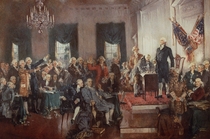 From Bret Stephens’ review of Edmund Morgan’s latest book:
From Bret Stephens’ review of Edmund Morgan’s latest book:
It is this kind of juxtaposition that makes 18th century history so fascinating. It shows how people can simultaneously hold in their heads rational ideas about life, liberty and the pursuit of happiness—which as Bernard Bailyn’s work shows these words from the declaration of independence were the ideological underpinning of popular support for the revolution—and believe that there are witches and that they are dangerous.in Philadelphia in 1787, Mr. Morgan uncovers one more instance of witch hunting, this one barely remembered, concerning an old woman named Korbmacher who died soon after being brutalized by a mob. Not much else is known about the incident, but Mr. Morgan is struck that this outbreak should occur in the same place where the Founders were gathering for the Constitutional Convention, the very summit of Enlightenment thought and action. There is no record that the founders took note of poor old Korbmacher. But the event was widely noted in the Philadelphia press, and Mr. Morgan suspects an influence on the thinking of the convention, specifically its distrust of popular rule. “It shocks us a little,” he writes, “as we read Madison’s notes of what his colleagues said, to find them at the very outset of the Convention fearful of an ‘excess of democracy’. . . . If, however, we bear in mind the actions of this particular mob . . . on the very doorstep of the Convention, we may perhaps take a more charitable view of the bias recorded in Madison’s journal.”







Comments